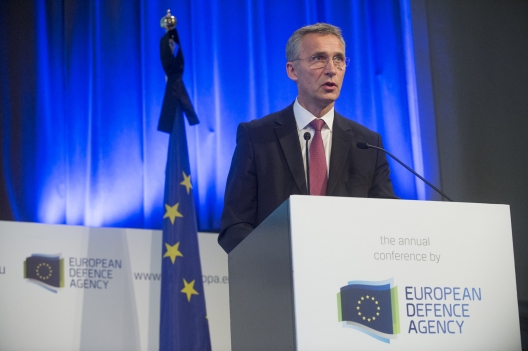 [T]he fight against terror is yet another example of how NATO and the European Union are natural partners. We share the same neighbourhood. We share the same complex security challenges. We share 22 member states. And more than 9 out of every 10 EU citizens live in a NATO country….
[T]he fight against terror is yet another example of how NATO and the European Union are natural partners. We share the same neighbourhood. We share the same complex security challenges. We share 22 member states. And more than 9 out of every 10 EU citizens live in a NATO country….
Our actions show how NATO and the EU are both determined to bring stability to our neighbourhood, and are working hard to achieve this.
But when the stakes are so high, and the needs are increasing, can NATO and the EU continue as we are? Working side-by-side towards similar ends, but not working together, hand-in-hand? I believe not.
I believe that we can achieve far more together in partnership. Our citizens are rarely distinguishing between what their nations do as members of one organisation or another. They want us to do what is necessary to keep them safe and secure.
So I see significant potential in several areas for improved and increased cooperation between NATO and the EU. Let me mention three.
First, in meeting hybrid threats….
Both NATO and the EU are seeking to prepare, deter and defend against hybrid warfare.
We both have civilian and military tools that complement each other. Combining those tools could make a big difference.
That is why it is essential that we work closely together in several areas: Improving our situational awareness, civil preparedness and resilience, cyber defence, strategic communications and joint training and exercises. So that when a crisis arises, we each know who to call on the other side of the town….
The second area for closer NATO-EU cooperation is helping partners in our neighbourhood….
Every NATO Ally contributes to the Global Coalition to counter and to destroy ISIL.We are also supporting countries such as Jordan, Tunisia, Iraq, and Ukraine, Moldova and Georgia and many others….
The EU is also boosting the defence capacity of its partners, as well as helping to develop their economies and their political institutions. So separately, we are making a difference. But just think how much greater that difference could be if we worked together….
And now, to my third area for closer cooperation: and that’s you. Europe’s defence and security industry….
NATO sets the standards for the defence sector, to ensure efficient, cost-effective and interoperable solutions. And, most important of all, we set guidelines for defence spending, with all 28 Heads of State and Government committing to spend 2% of GDP on defence, as our economies grow.
We are not there yet. The picture is mixed, but there is progress. For instance, Estonia and Poland have this year reached the 2 percent, and many other Allies in central and Eastern Europe have laid out a roadmap to do the same.
The UK is increasing its defence spending in real terms and will stay above 2 percent. France is near to 2 percent, and Germany is making efforts to raise its defence spending.
All of this matters and all of this shows that more and more Allies are moving towards the 2 percent goal.
Once there was a time to collect the peace dividend. Now is the time to invest in our defence.
Excerpts from special address by Secretary General Jens Stoltenberg at the annual European Defence Agency (EDA) conference, November 16, 2015.
Image: Secretary General Jens Stoltenberg at EDA conference, Nov. 16, 2015 (photo: NATO)
